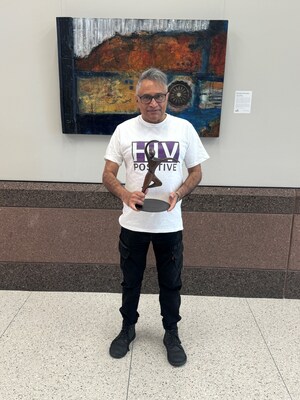COLUMBUS, Ohio, April 5, 2018 /PRNewswire-USNewswire/ -- James F. Sallis, PhD, a distinguished professor emeritus of family medicine and public health at the University of California San Diego and professorial fellow at Australian Catholic University in Melbourne, today was presented the 2018 Elizabeth Fries Health Education Award. This year's award was presented to Sallis at the 69th Annual Meeting of the Society for Public Health Education (SOPHE). The CDC Foundation with the James F. and Sarah T. Fries Foundation honored Sallis for building an interdisciplinary field of active living research, identifying solutions to the global problem of physical inactivity and translating research findings from the built environment into action.
The Elizabeth Fries Health Education Award, first presented in 1992, recognizes a health educator who has made a substantial contribution to advancing the field of health education or health promotion through research, program development or program delivery.
For 15 years Sallis directed the Active Living Research program for the Robert Wood Johnson Foundation, which support research and promotes activity-friendly communities. His primary research interests are promoting physical activity and providing evidence to guide policy and environmental strategies to improve physical activity, sedentary behavior, nutrition, and obesity, with an emphasis on youth. His health improvement programs have been studied and used in health care settings, schools, universities and companies.
"Dr. Sallis has devoted his career to the study of physical activity and his research has led to more healthful environments and more active lifestyles," said Lawrence Green, DrPH, ScD (Hon), Chair, James F. and Sarah T. Fries Foundation Board of Directors. "We are grateful for his work in advocating for more active-friendly environments and honored to present him with the Elizabeth Fries Health Education Award."
In the United States, the vast majority of adults do not meet the physical activity guidelines of 150 minutes per week. Inactive lifestyles put most adults at risk of cardiovascular diseases, diabetes, obesity, numerous cancers, osteoporosis and psychological disorders. Physical activity can be effective in managing all phases of chronic disease. Research suggests that sprawling cities, often obligating residents to drive frequently, offer fewer opportunities than compact urban areas for walking or biking.
As a pioneer in the active living research field, Sallis has developed critical evidence about the role of built and social environments in shaping physical activity patterns. His work has contributed to movements such as Complete Street Policies, which encourage a safe, comfortable, integrated transportation network for all users, the Urban Land Institute's Building Healthy Places Initiative, the National Association of City Transportation Officials' standards for pedestrian and bicycle-oriented streets, and the American Institute of Architects' Design and Health Initiative. These initiatives have influenced city planning and transportation policies and decision making that have led to improvements in health and more accessible, safer physical activity options.
Sallis developed intervention programs in school and community settings, including the award-winning SPARK (Sports Play and Active Recreation for Kids) physical activity program that has led to increased activity among more than 1.5 million kids at school. SPARK creates, implements and evaluates programs to improve health and lifelong wellness.
He launched the International Physical Activity and Environment Network (IPEN) with the goal to stimulate collaborative research in physical activity and the environment, develop common methods and measures, mentor researchers, and bring together data from multiple countries for joint analyses. Approximately 20 countries from all continents are currently engaged in collaborative studies.
Sallis is the author of more than 700 scientific publications and one of the world's most cited social science authors. He has received numerous recognitions including the President's Council on Fitness, Sports & Nutrition Lifetime Achievement Award and TIME's designation as an "obesity warrior."
The Elizabeth Fries Health Education Award was named in memory of Elizabeth Fries, who was a professor of psychology at Virginia Commonwealth University and co-director of the Massey Cancer Center Outreach Program. She made many important contributions to program development, implementation and evaluation. The Elizabeth Fries Health Education Award recipients receive a $25,000 prize. The award and lecture have been presented annually at the SOPHE conference, which draws approximately 900 health education researchers, faculty, practitioners and students for the latest research and practice in health education. Founded in 1950, SOPHE's mission is to provide global leadership in health promotion and to promote the health of society.
The James F. and Sarah T. Fries Foundation is a nonprofit corporation incorporated in 1991. The mission of the Foundation is to identify and honor individuals, organizations or institutions that have made great contributions to the health of the public. The Foundation seeks to reward accomplishment rather than promise, practicality rather than theory.
The CDC Foundation is honored to partner with the James F. and Sarah T. Fries Foundation, which established and funds the award. As of 2016, the CDC Foundation manages and administers the Fries Foundation's public health award programs, which include the Fries Prize for Improving Health and the Elizabeth Fries Health Education Award.
About the CDC Foundation
The CDC Foundation helps the Centers for Disease Control and Prevention (CDC) save and improve lives by unleashing the power of collaboration between CDC, philanthropies, corporations, organizations and individuals to protect the health, safety and security of America and the world. The CDC Foundation is the sole entity authorized by Congress to mobilize philanthropic partners and private-sector resources to support CDC's critical health protection mission. Since 1995, the CDC Foundation has launched approximately 1,000 programs and raised over $740 million. The CDC Foundation manages over 300 CDC-led programs in the United States and in more than 130 countries. For more information, visit https://www.cdcfoundation.org. Follow the Foundation on Twitter, Facebook, LinkedIn and Instagram.
SOURCE CDC Foundation
Related Links
WANT YOUR COMPANY'S NEWS FEATURED ON PRNEWSWIRE.COM?
Newsrooms &
Influencers
Digital Media
Outlets
Journalists
Opted In






Share this article